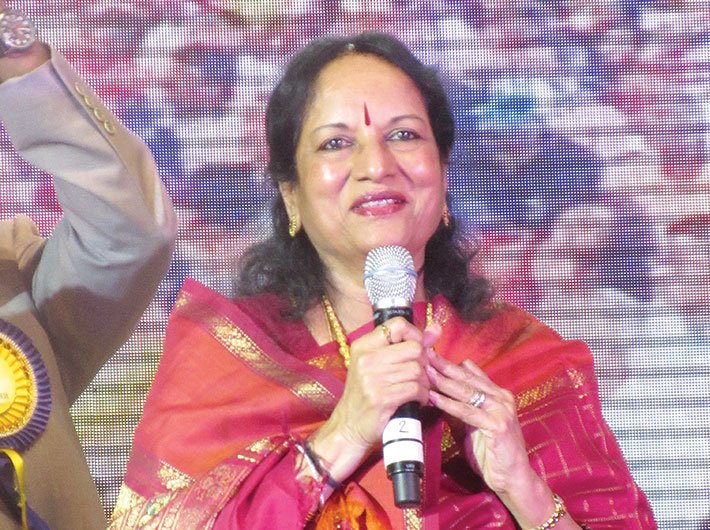Vani Jairam’s childhood dream of becoming a playback singer was realised when veteran film music composer Vasant Desai gave her the opportunity to sing Bole Re Papi Hara and two other songs in the movie Guddi. After that, the multilingual singer went on to sing for eminent music personalities like Naushad, Madan Mohan, RD Burman and AR Rahman. Her songs in the film Meera, which were composed by Pandit Ravi Shankar, won her the Filmfare Award. Recipient of many other national and state awards, she has sung in various styles like Carnatic and Hindustani music, ghazals, pop and folk.
An artiste’s role in society:
An artiste should not only be totally involved with his/her art but feel and share the concern for the society in whatever way possible. Artistes can educate the poor, teach their art free of cost and perform for noble causes.
Problems initially faced in the industry:
Luckily for me, my guru, Ustad Abdul Rahman Khan Saheb, spoke with the great music director, Sri Vasant Desai, about my voice and talent. Desaiji called me to sing in the film Guddi. The songs became very popular and made me a household name. So I didn’t face any problem.
Thing that brought you closer to music:
I was born in a musical family. Initially my mother trained me along with all my sisters. Later, I learnt from eminent gurus, both Carnatic and Hindustani music. But listening to Hindi film music (in the 1950s and 1960s) nurtured my skill. It gave me the urge and drive to seek my goal.
Your favourite form of music:
Music is universal. It has no language. Anything that appeals to you and touches your heart – be it classical, folk, western or film.
Your take on fusion music:
There is nothing wrong with fusion music. But an artiste should keep his/her form of music without compromising it. Suppose a Carnatic and a Hindustani musician perform together in a fusion concert. The Hindustani audience gets to know about Carnatic music and the Carnatic audience gets to know about Hindustani music. This way one can make full use of one’s abilities. It is welcome provided you stick to your form.
Role of stage performances in your career:
I have been giving stage shows since 1969, all across India and in other countries. My stage shows include various forms of music such as Hindi bhajans, film music, regional film music and devotional songs, in several languages. This way we [artistes] constantly keep in touch with the audience. Even the audience comes to know our current form and enjoy the music. Performing in public is very important.
An unforgettable moment of your life:
April 1980. On April 13 I received the Tamil Nadu state award for the best singer, on April 19 I received the Filmfare Best Female Playback Award for the film Meera and on April 24 I received the award for Best Female Playback Singer (Telugu) from the president for the film Sankarabharanam. So, April 1980 is the most unforgettable time of my life.
Advice to aspiring musicians:
I never advise. I only request. Stay focused, pursue your art with passion and work hard. There is no substitute for hard work. Never feel jealous. Allow others to grow. Above all, stay humble. Never be arrogant or proud.
Major challenges India is facing:
People suffer because there is so much of corruption at every level. It makes living almost a punishment in our society. Crime has to be controlled. Make education less expensive, even free up to a certain level. Girls’ education must be given immediate attention. We are facing animosity from our neighbouring countries. This has to be dealt with in a very careful way. Our tourism can be developed to a great extent as our country has so much to offer. Every citizen should work towards cleanliness and keep the environment clean. Our country has all the potential to be a great world power. We should work constantly for the betterment of society.
(The interview appears in the June 16-30, 2017 issue of Governance Now)

